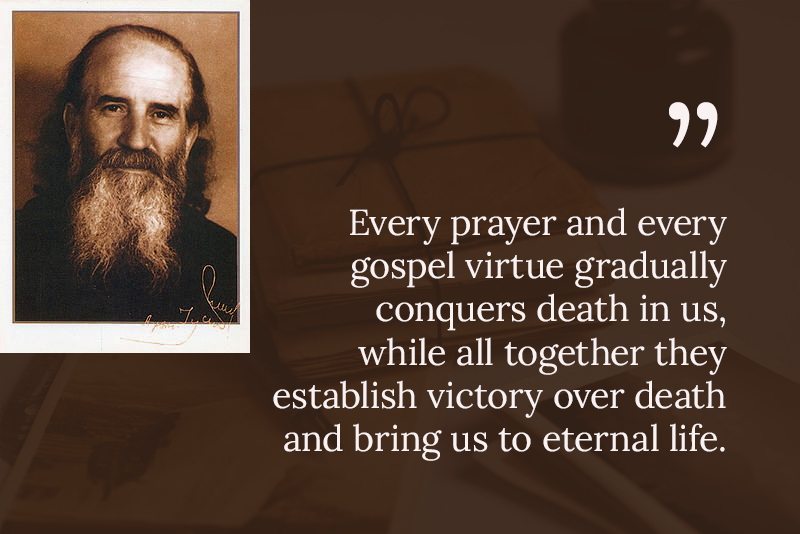
1. It is all very well to speak about forgiving other people’s wrongs when nothing goes against our will or hurts our self-esteem. Moreover, the sense of bitterness or of being trampled upon that others might have in such situations might seem odd to us. However, we, too, might be put in circumstances when one look, let alone a word, may lead us outside ourselves. That way, we might delude ourselves into believing, conceitedly, that it is possible to live as Christians without the help of our Lord and with a relaxed spirit. But when the evil that had built up at the bottom of our hearts will rise to the surface like dust in the wind, then we will all be shamed for our conceit.
When thought after thought and desire after sting our soul one worse than the other, may we all hurry to forget about ourselves and cry out silently like the Prophet did: “I sink in the miry depths, where there is no foothold. I have come into the deep waters; the floods engulf me.” Psalms 69:2). LORD, save us! (Psalms Psalms 118:25).
2. The merciful Lord is ready to forgive us all. We only need to repent and trust in His mercy. He would even have clemency on the devils if they repented. But because they have become so hardened in their opposition to the Lord, they cannot hope for any mercy. It is the same way with people. Forgiveness is not possible for those who persist in opposing the Lord. Some do, and you know it, I suppose. Many of them depart to the other world as enemies and haters of God, something that you also cannot deny. What awaits them there?
That is a foregone conclusion.
Just like they knew no God, so the Lord will tell them, ‘I do not know you. Step away!”
Why can overrule this judgement of the Lord!
It is like the seal of hell, a sign of His eternal rejection!
3. We have made it a custom to put ‘faith from reason’ in opposition to ‘blind faith’. By blind faith, we mean the learned kind of faith, not satisfied to say “God commanded it, and I believe”. Instead, they add the conclusions of their mind to all matters of faith and speak of them as they were the product of their reason, ashamed to even mention God’s command seeing in it a humiliation of their minds. Some go as far as refusing to believe anything that they cannot put on the foundation of reason or reconcile with the sum of their ideas and pre-set beliefs about the world.
4. Pray that the Lord will shed His grace on your work to melt your rock-hard hard; pray that He will come to awaken your slumbering soul and soften. Pray with your own words; vent what is on your soul lay bare your innermost needs in the simple and gentle words of a child.
Do not theorise, or make up new prayers.
Put forth with simplicity your single greatest need, like a patient before a doctor, like a prisoner to his liberator; admit your failings with genuine repentance; acknowledge your powerlessness to overcome yourself and surrender yourself fully to His will. Fall prostrate, make bows repetitively. Do not stop the prayer while you have the desire to pray. When your prayerful mood subsides, go back to contemplation, and then again to prayer.
For your prayer, save the shortest pleas to God:
“Have mercy on your creation, O Lord Almighty!” “Lord, have mercy on me, a sinner”. “O Lord, Save me!” “O Lord, Come quickly to my aid!” Remember the church hymns: “Here comes the groom” “Awake my soul, why are you sleeping”, and the like.
Make yourself work hard in this way, and knock unstoppably at the door of His mercy.
6. Delaying is a common fault and the first reason for our neglect.
Many say: “I still have time”, and persist in their past harmful ways as before.
So when the good thought of correcting yourself visits you, grasp at it, get down to work to change the things for which it had been sent to you, and put an end to your habit of delaying.
7. The work of prayer is the first work in Christian life. Prayer is the breath of the Spirit. If there is prayer, the soul lives; without prayer, there is no spiritual life.
Standing at home before your icons, or here in church, and venerating them is not yet prayer, but the “equipment” of prayer. Reading prayers either by heart or from a book, or hearing someone else read them is not yet prayer, but only a tool or method for obtaining and awakening prayer. Prayer itself is the piercing of our hearts by pious feelings towards God, one after another – feelings of humility, submission, gratitude, doxology, forgiveness, heartfelt prostration, brokenness, conformity to the will of God, etc.
8. In your illness, learn; learn humility, patience, goodwill and thankfulness to God. Impatience is human. When it comes, chase it away. The sense of hardship exists to exercise your patience. When you do not feel the hardship, you do not have patience. But when the sense of hardship comes, along with the desire to throw it off, there is no sin in it. There is nothing unnatural about it, either. It begins to be sinful at the point when the soul succumbs itself to impatience and discontent because of this sensation. When the sensation comes, chase it away and thank God.
9. We have the All-Merciful Lord always ready to come to our rescue. To Him, you should turn the eyes of your mind and your heart. If you cannot go to church, pray at home.
Teach yourself to walk always as in the presence of God. Remind yourself about the Lord who is everywhere present and fills all things, and act in your thoughts and deeds as if you were standing before the eyes of our Lord. Keep yourself preoccupied with this only, until the thought of God becomes integral to your mind.
If you are successful, you will need no further advice from others. Your fear of God will guide you in all your actions.
10. When the prayer is right, all else is right.
Translated by The Catalogue of Good Deeds




